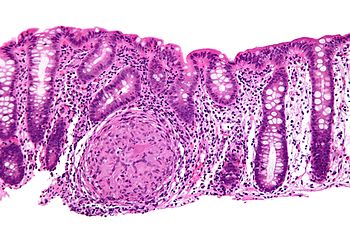| Crohn's disease - esophagus - intermed mag.jpg (Photo credit: Wikipedia) |
Good nutrition is one of the ways the body restores and heals itself. Therefore, every effort must be made to avoid becoming malnourished. Protein is a key nutritional element in the recovery process. Consume healthy proteins such as lean cuts of chicken and fish. A protein deficiency can lead to fatigue, insulin resistance, and loss of muscle mass.
Iron deficiency is fairly common in people with ulcerative colitis and Crohn's colitis and less common in those with small intestine disease. It results from blood loss following inflammation and ulceration of the colon.
Try teaming iron-rich foods such as poultry, naturally fermented soy foods, and some fortified foods such as whole grain cereals with fruits and vegetables that are rich in vitamin C like potatoes, broccoli, cauliflower, Brussels sprouts, red and green bell peppers, and cabbage. This food partnership improves the iron absorption rate, and the vitamin C gives the immune system a boost.
Restrict your consumption of certain high-fiber foods such as nuts, seeds, corn. High-fiber foods also provoke contractions once they enter the large intestine and can cause cramping as a result. They may also cause diarrhea, since they are not completely digested by the small intestine. Sometimes a low-fiber diet is necessary minimize abdominal pain and cramping symptoms.
It may also be necessary to supplement your diet with nutritional supplements to ensure your body is getting the proper amount of vitamins and minerals needed.
Nutrition is one of the best ways to combat disease of all types, and Crohn's is no exception. It can be a very trying disease, to say the least, but eating the right foods in the right combination can help make your life a bit better - and your body healthier.


No comments:
Post a Comment